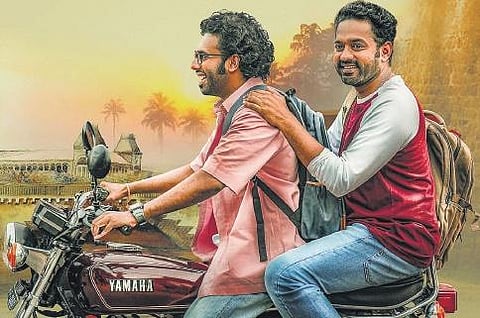

It’s only fitting that an accomplished sound designer’s directorial debut uses sound as a trigger to revisit past traumas. For one man, it’s a palm rapping on a window pane. For another, it’s a dog. For a third, it’s a movie song. There are more characters with various other triggers, and Resul Pookutty makes it quite clear in his maiden directorial that he is not here to make you feel good but to leave you numb after taking you to not only some of the darkest corners of this planet but also of the human mind.
It goes without saying that one can’t mention this suitably gritty film—revolving around runaways who have experienced separation, loneliness, physical and psychological abuse, hunger, poverty, and sexual assault—without mentioning multiple trigger warnings. Naturally, this review will not discuss the specifics but give you a general picture of what to expect.
The approach that Resul has adopted in handling the material, based on S Hariharan’s non-fiction book, Runaway Children, is one that combines mainstream and arthouse sensibilities. So, if a picture has already formed in your mind about Otta being an ‘award movie’, I would urge you to dismiss that notion. Had Resul gone for a completely arthouse approach, I believe Otta would’ve been a much more devastating experience. There are a few songs occasionally punctuating the narrative, and though I’m a viewer who prefers films to be entirely devoid of songs, I can’t imagine some films functioning without them either. In Otta, they certainly serve as a brief respite before moving on to another hard-hitting event.
Though handled with a cinematic touch—visually speaking, of course—Resul refrains from giving us any ‘heroic’ moment. In one particularly traumatising scene, the principal protagonist, instead of becoming a saviour, is rendered helpless and, in doing so, Otta reminds us that though we are watching a movie, the individual we expect to do a ‘heroic’ deed may not be capable of it because he is playing a real-life character. I was reminded of what author Stieg Larsson said about writing his Millenium trilogy (e.g. The Girl With the Dragon Tattoo) as a response to his inability to do anything for a female friend who experienced a haunting ordeal.
Now, before you assume that Otta is the most depressing film ever made on this planet, let me assure you that it’s not. But, I also don’t recommend watching it while going through a dark phase in your life. I can’t speak, however, for those tormented souls who might find some therapeutic relief after witnessing one or more of the events depicted in the film, because that also happens to be a truism.
After all, Otta is a film about multiple individuals with traumatic experiences crossing paths and finding relief in shared experiences, even if briefly. As I said earlier, I’m not going to describe any of the events in the film because I don’t want to be that critic who writes the entire story in the review. And Otta is one of those films which is better experienced after knowing little to nothing about it.
However, before I conclude my review, I want to express my admiration for some of the performances, particularly of Asif Ali, Indrajith Sukumaran, Arjun Ashokan, and Sathyaraj. Asif, of course, would put up a good show when given the right script. Otta provides plenty of instances to remind us of his strong acting prowess. Asif neither overplays nor underplays his character. The meter is just right.
While I’m glad to see Indrajith Sukumaran in an immensely poignant role, I have a minor quibble about being unable to comprehend a few specifics of the traumatic incident that left his character permanently scarred. But this is mainly due to a particular Thiruvananthapuram dialect and the usage of certain words which I couldn’t make out.
Thankfully, the actor’s heartbreaking rendering of his inner turmoil—through his wonderfully expressive face and body language—is enough for us to understand his character’s pain. I would say this is one of those performances where Indrajith the actor is more prominent than Indrajith the star. And as for Arjun Ashokan, this is by far the darkest of all his roles. Without giving anything away, I would say that if you’re a dog lover like me, you might want to brace yourself.
I’ve heard that the film only depicts a small percentage of what these individuals actually went through. I’m glad Resul chose not to show us all the details because whatever little he shows us is enough to leave one with a heavy heart. Sometimes, unseen horrors are more chilling than the seen. In Otta, some ‘villains’ are humanised because it’s unfair to discuss them as ‘bad’ and because they have the potential for redemption, whereas others are not. The latter doesn’t get punished either because, once again, Otta is not a ‘movie’ movie.
Yes, the overall experience is devastating, but, to put it simply, the purpose here, I believe, is to make us reflect on our dear ones and hold them close to our hearts instead of alienating them. There are times during which we have to lend someone a helping hand to rescue them from darkness, but at others, the only way to help them is to leave them alone. Otta may not make you feel good, but in this day and age, perhaps a film like this is needed to give one the necessary jolt.
Film: Otta
Director: Resul Pookutty
Cast: Asif Ali, Arjun Ashokan, Indrajith Sukumaran, Sathyaraj, Rohini, V Jayaprakash
Rating : 3.5/5